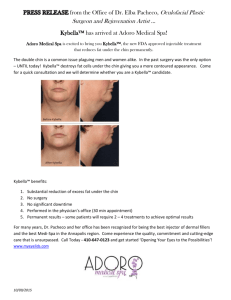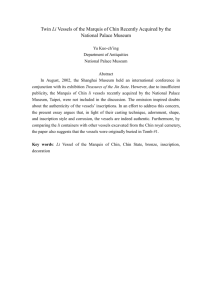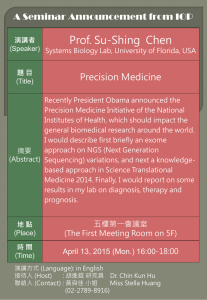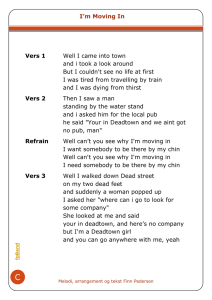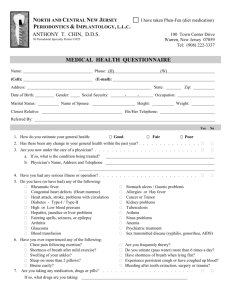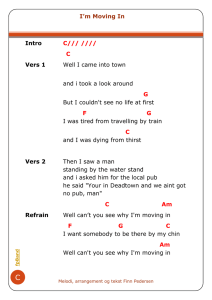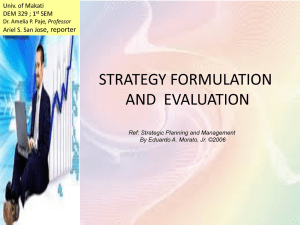Family analysis.doc
advertisement
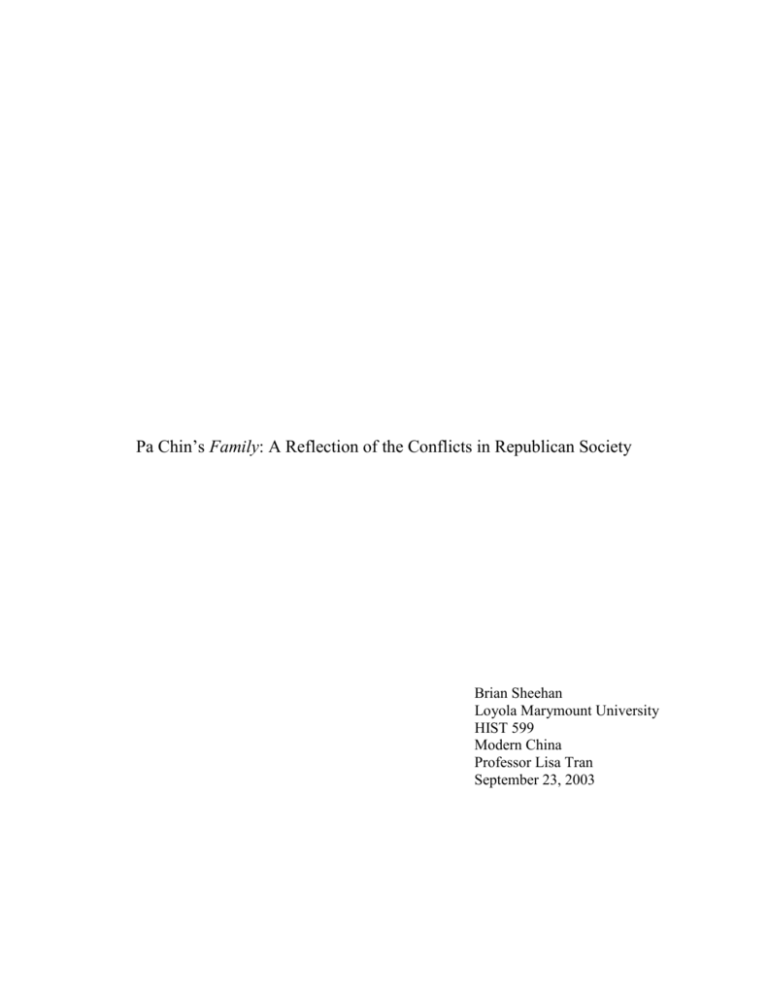
Pa Chin’s Family: A Reflection of the Conflicts in Republican Society Brian Sheehan Loyola Marymount University HIST 599 Modern China Professor Lisa Tran September 23, 2003 2 Introduction The purpose of this paper is to examine Pa Chin’s novel Family (1931) and to explain how it reflects Chinese society during the Republican era. We will see that Family exemplifies Republican society by bringing into sharp focus the conflicts and contradictions between China’s old world/old culture traditions and the emerging new world/new culture movements. These conflicts and contradictions are laid bare in the every day life of the Kao family’s four generations. The characters’ internal conflicts, filial conflicts, and external conflicts mirror those of Republican society as a whole. They are played out, quite melodramatically, between the older and younger Kao generations; their daily struggle serving as an allegory of China’s transition into the modern world. Fundamentally, the Republic was a time of painful transition between the old world and the new. Family brings this transition to life in human terms. This paper contains three sections. The first section identifies specific generational conflicts. The second section explores relevant themes. The third section identifies the book’s salient symbols. Conflicts Relating to Republican Society Pa Chin highlights numerous conflicts between the older and younger Kao generations, leaving no doubt that his sympathies lie with the struggle of the younger generation to reshape their reality. He prefers the “clear water” of the new order to the “muddy water” of the old order. Pa Chin’s central character, Chueh-hui, is clearly espousing the beliefs of the young Pa Chin. The central conflict of Family is the battle between the Confucian value system and a more progressive approach that emphasizes free thought and free action. We see the Kao family struggle with every aspect of their Confucian tradition. Sub-conflicts abound, including: filial piety vs. mutual respect, value of age/wisdom vs. value of youth/new ideas, fate vs. free choice, 3 resignation, vs. action, dictatorial monologue vs. democratic dialogue. These sub-conflicts are brought to life most dramatically in the love lives of the three Kao brothers: Chueh-hsin, Chuehmin, and Chueh-hui. Acceptance or non-acceptance of their and their loved ones’ fate, as dictated by the venerable master Kao, have both tragic and heroic consequences. For example, Chueh-hsin’s failure to stand up against his arranged marriage dooms him to a life of toadyism, “compliantly bowing” his way from day to day. Because of his compliance, his true love, Cousin Mei, is forced into a brutal, loveless marriage; and later, when she is free, but unable to have the man she loves, she dies of a broken heart. Chueh-hsin’s spinelessness also leads to the death of the other woman he loves, his wife. On the other hand, when Chueh-min is put in a similar situation, his resistance against Confucian orthodoxy leads to success. Chueh-min’s resistance and his grandfather’s last-breath acceptance, salvaging Chueh-min’s and Chin’s future, provide a strong message of hope for China’s younger generation. The most fascinating love affair is between Chueh-hui, our erstwhile hero, and Ming-feng. Their love crosses the bounds of Confucian fate twice. First, relating to free choice. Second, relating to social stratification. Despite Chueh-hui’s proclamations of love and resistance, he is a paper lion, failing to take action before, during, or even after Ming-feng’s demise. Chueh-hui’s rationalization of his behavior is the central tragedy of Family. Pa Chin exposes Chueh-hui’s essential hypocrisy, and warns all readers of the moral risks and real human cost of espousing revolution without taking action, when he says: There were two things in the in the back of his mind with which he was already consoling himself for Ming-feng’s loss. One was that he wanted to devote himself entirely to serving society. The other was that a person of his position could never really marry a bondmaid – his petty bourgeois pride would not permit it. (p. 218) Later when Chueh-hui levels his vicious accusation at Chueh-hsin: “One girl has already died because of you” (p.301), the irony is that his brother could respond in kind. 4 Themes Relating to Republican Society We will explore three themes that permeate Family and reflect Republican society at large. The first theme is: defense of the weak. Pa Chin shows that the weakest people in society suffer the most as they are preyed upon by the rich and strong; therefore, need the most protection. We see this clearly in Pa Chin’s empathy towards three of society’s most powerless groups: servants, women, and youth. All three are tragic figures in Pa Chin’s picture of the Confucian world. As a youth, woman, and servant, Ming-feng’s loss is Family’s most heart wrenching. Her death by drowning is a direct allusion to the “chaste women” of Chinese history (e.g., Chaste Woman Wu). There is heroism in Ming-feng’s death, however. She takes her life before being despoiled, making the social convention of keeping concubines tantamount to rape. She is, indeed, a chaste woman. Defense of the weak is a theme even in the book’s empathetic portrayal of weak-minded men, of whom Chueh-hsin and Chien-yun are the best examples. The second theme is: good people forced to do bad things. Throughout the book, even the most enlightened members of the Kao younger generation cause pain and suffering by fulfilling what they see as their filial duty. This theme is presented over and over in the case of Chueh-hsin whose fear of being seen as “unfilial” brings harm to everyone he loves. When confronted with Chueh-min’s disappearance for example, we read: “Yet not only couldn’t he [Chueh-hsin] help him – he had to help his grandfather oppress him” (p. 260). The third theme is: corrupted Confucianism. Pa Chin adroitly demonstrates that the application of Confucianism has become arbitrary and somewhat arcane by the early 1900’s. He persuades us that although Confucianism may have had some valuable intent and purpose, it is no longer having a beneficial effect on families as the basis of society as a whole. We see this demonstrated quite poignantly when Jui-Chueh is sent away to have her baby outside the city 5 gates. In this case the corrupting influence is superstition. As the servant Yuan Cheng notes: “Only rich people have all the rules and customs” (p. 299). Later Chueh-hsin realizes as much, understanding that the door separating him from his dying wife is “the entire social system, with its moral code, its superstitions” (p. 309). Pa Chin’s most powerful denunciation of Confucianism indicates that the system is not just corrupted, but rotten to the core: “The old rich family, which depended on ancient morality to sustain itself, revealed its inner emptiness. No one cared about anyone else. Each was concerned solely with his own personal safety” (p. 175). Symbols Relating to Republican Society We will explore three important symbols which give us a greater understanding of Republican Society. The first symbol is the military battle that rages around the city of Chengdu and right up to the gates of the Kao family compound. This battle symbolizes that the “battle” to reshape China is not just waged between armies, but within families, and within individuals. Whether families overthrow the tenets of Confucianism, and whether individuals choose to take action and “fight,” or just hide in submission, will decide whether China’s transition will be for better or worse. Status quo is not realistic to Pa Chin, who sees life as a “Turbulent Stream” propelling us forward through time. He is exhorting the reader to take action, and to make sure their actions create a better future. The two generals who act as Governor-General of Chengdu are another strong symbol. They symbolize the aimless, feckless, and corrupt Republican governments, as they existed during the period of warlordism. It is important that neither general brings about any significant reform. These governments are not progressive. They are not even differentiated. Pa Chin is telling his readers that the civil wars are more about power struggle than about visions for modern China. Pa Chin believes that China needs a new vision, a new movement. 6 The third and perhaps most powerful symbol is the Kao family itself, and its male generations. Master Kao is a symbol of the Qing dynasty: detached, dictatorial, shrouded in mystery, yet reform-minded on his/its deathbed. The generation of the uncles (Ke-ming, et. al.) represent the republican governments: divided, frivolous, corrupt and lascivious, as exemplified by their bickering, mahjong playing, opium smoking, and frolicking with female impersonators and prostitutes. Chueh-hui and his brothers represent the youth of China, on whose shoulders the future of China rests. They are China’s greatest hope; but they are also potentially China’s greatest disappointment. Conclusion Family reads less like a novel and more like a political manifesto played as soap opera. However, the book’s melodramatic populism is intentional. Pa Chin’s goal is not to weave a story for its own sake, but rather, to create a piece of propaganda that will incite youth against the egregious practices of the old culture, and convince them to rebel with other young Chinese to create a new order. As we have seen, Family works admirably because, although exaggerated, it accurately depicts the issues of Republican society and the seamy underbelly of the Confucian system. Family is most fascinating to the 21st century reader because of its prescience. Pa Chin clearly understands both the rewards and the risks of the rebellion to come. Family is a harbinger of China’s painful 20th century experience. Though Pa Chin’s political views are more concerned with anarchism and applied ethics, Family gives us a taste of, and a deeper understanding of, the social and individual crises that would lead directly to both the Communist Revolution and its subsequent terrors, most notably the Cultural Revolution. Although he was more hopeful than despairing about the future, Pa Chin was clear about the downside of revolution, since all 7 political movements depend on the frailty of the individuals involved. Pa Chin would not have disagreed with Lord Macartney’s piercing prophecy: Their condition, however, might then become still worse than it can be at present. Like the slave who fled into the desert from his chains and was devoured by the lion, they may draw upon themselves the oppression and destruction by their very effort to avoid them, may be poisoned by their own remedies and be buried themselves in the graves they dug for others. (Cheng & Lestz, 1999, p. 103) But he hoped for much, much better.
